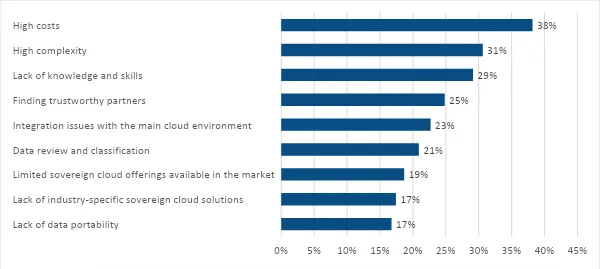Few would disagree that for most organizations, a hybrid and multicloud approach is the way forward for IT deployments.
Evidence of this is provided by IDC's 2023 EMEA Cloud Survey. When asked on which IT environments they spend most of their IT budgets, traditional on-premises IT was the top answer for 27% of organizations across Europe.
But cloud is not far behind: 26% of organizations spend most of their budget on a combination of private and public cloud (hybrid). The rest invest in other types of cloud deployments, such as public cloud for IaaS and PaaS, SaaS, on-prem private clouds, or multiple public clouds.
The use of sovereign cloud is also gaining traction across Europe.
As mentioned in my previous blog, “Ensuring Sovereign Cloud Does Not Equal Limited Cloud,” an overwhelming majority of organizations in Europe say they are either already using sovereign cloud solutions or plan to do so in the next 12 months.
But a sovereign cloud will not be the only cloud these organizations use — and it will add complexity to an already complex IT environment, given the various types of IT implementations they are spending their budgets on.
IDC research reveals that the top 3 challenges for organizations in Europe using sovereign cloud solutions include high costs, high complexity, and a lack of skills.
What are your organization’s main challenges in using a sovereign cloud solution?

Source: IDC’s 2023 EMEA Cloud Survey (August 2023); N = 1,349
Digital sovereignty can increase the costs of doing business globally.
Extra costs cover areas such as investments in local infrastructure and platforms, new tools for data governance and management, and redesigning internal processes and mechanisms to ensure compliance.
More than one-third (38%) of organizations cite high costs as a challenge, but those seeking sovereign solutions are willing to pay a premium. Asked how much of their IT spending they were willing to allocate to solutions for cloud sovereignty, the sweet spot was 11% to 20% for most organizations in Europe.
The second biggest hurdle is high complexity. This begins even before organizations can consider integrating a sovereign cloud into existing cloud assets and resources.
Implementing a sovereign solution begins with reviewing and identifying the full set of data and workloads that will be subject to sovereign requirements (this will be discussed in greater detail in my forthcoming blog, “Implementing Digital Sovereignty: The Decision Framework”).
New knowledge and skills are likely to be needed — and this is identified as a top challenge by 29% of organizations in IDC's survey.
Many organizations globally are facing an IT talent shortage and find it difficult to hire the skills needed to execute their digital transformation strategies. Indeed, 31% of those currently using sovereign cloud solutions in Europe say the general cloud skills shortage will prevent them from realizing the full business benefits and value of cloud.
The need for sovereign cloud exacerbates this.
Some of the specific skills organizations are likely to require include expertise in data management and governance, cybersecurity, and API development (combining all this with a certain degree of jurisprudence and business acumen would not go amiss, either).
As a result, many organizations will have to consider investing in training existing staff or looking for new talent (which, as already mentioned, can be hard to find). This adds further cost.
Organizations seeking sovereign cloud solutions are likely to lean more heavily on their service providers for support. Organizations say their technology investment and partnership priorities will be most influenced by providers that can deliver control over data access, regulatory compliance, and resilience.
Asked what factors they considered when selecting a cloud platform for migrating and modernizing their apps, the top answer for 30% of sovereign cloud users in Europe was security measures, data encryption, compliance certifications, and adherence to regulations.
Other main factors include cost effectiveness (29%), availability and reliability (22%), and interoperability (20%), which covers compatibility with different operating systems, programming languages, and frameworks.
If providers want to be seen as the go-to partners for organizations seeking sovereign solutions, they will need to offer a broad level of expertise. They will need to demonstrate key capabilities in all the challenges highlighted here if they are to help users integrate a sovereign cloud into their existing hybrid IT and multicloud strategies.
À propos de l'auteur
Rahiel Nasir is responsible for leading and contributing to IDC's European cloud and cloud data management research programs, as well as supporting associated consulting projects.
In addition, he is the lead analyst for IDC's worldwide Digital Sovereignty research program.
Nasir has been watching technology markets and writing about them throughout his professional life.
Prior to joining IDC, he was a research analyst with 451 Research (now part of S&P Global Market Intelligence), where he covered the datacenter infrastructure and services markets across the EMEA region.
Plus de résultats similaires
IT automation with agentic AI: Introducing the MCP server for Red Hat Ansible Automation Platform
Fast and simple AI deployment on Intel Xeon with Red Hat OpenShift
Data Security 101 | Compiler
Technically Speaking | Build a production-ready AI toolbox
Parcourir par canal
Automatisation
Les dernières nouveautés en matière d'automatisation informatique pour les technologies, les équipes et les environnements
Intelligence artificielle
Actualité sur les plateformes qui permettent aux clients d'exécuter des charges de travail d'IA sur tout type d'environnement
Cloud hybride ouvert
Découvrez comment créer un avenir flexible grâce au cloud hybride
Sécurité
Les dernières actualités sur la façon dont nous réduisons les risques dans tous les environnements et technologies
Edge computing
Actualité sur les plateformes qui simplifient les opérations en périphérie
Infrastructure
Les dernières nouveautés sur la plateforme Linux d'entreprise leader au monde
Applications
À l’intérieur de nos solutions aux défis d’application les plus difficiles
Virtualisation
L'avenir de la virtualisation d'entreprise pour vos charges de travail sur site ou sur le cloud
